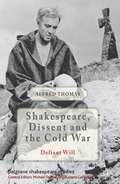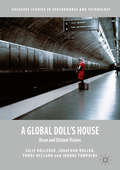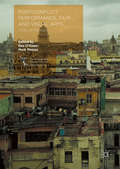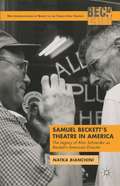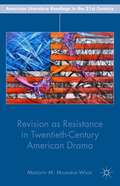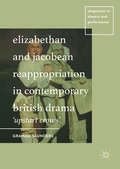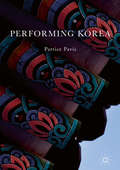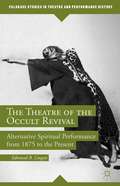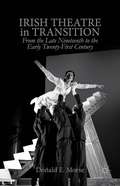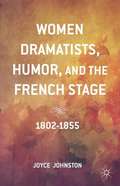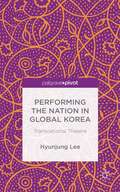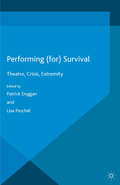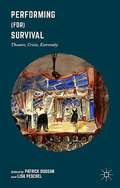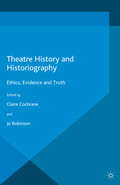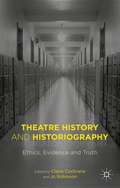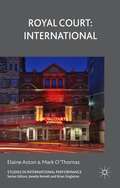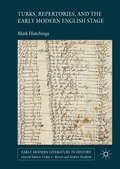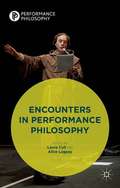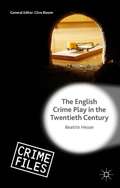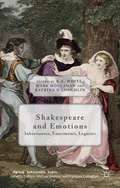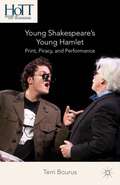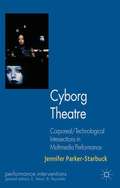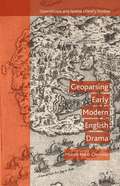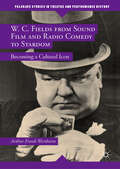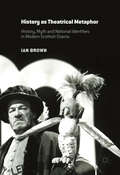- Table View
- List View
Shakespeare, Dissent, and the Cold War
by Alfred ThomasShakespeare, Dissent and the Cold War is the first book to read Shakespeare's drama through the lens of Cold War politics. The book uses the Cold War experience of dissenting artists in theatre and film to highlight the coded religio-political subtexts in Hamlet, King Lear, Macbeth and The Winter's Tale.
A Global Doll's House: Ibsen and Distant Visions (Palgrave Studies in Performance and Technology)
by Julie Holledge Jonathan Bollen Frode Helland Joanne TompkinsThis book addresses a deceptively simple question: what accounts for the global success of A Doll's House, Henrik Ibsen's most popular play? Using maps, networks, and images to explore the world history of the play's production, this question is considered from two angles: cultural transmission and adaptation. Analysing the play's transmission reveals the social, economic, and political forces that have secured its place in the canon of world drama; a comparative study of the play's 135-year production history across five continents offers new insights into theatrical adaptation. Key areas of research include the global tours of nineteenth-century actress-managers, Norway's soft diplomacy in promoting gender equality, representations of the female performing body, and the sexual vectors of social change in theatre.
Post-Conflict Performance, Film and Visual Arts
by Des O'Rawe Mark PhelanDrawing on a range of cities and conflicts from Europe, Africa and the Middle East, the collection explores the post-conflict condition as it is lived and expressed in modern cities such as Berlin, Belfast, Bilbao, Beirut, Derry, Skopje, Sarajevo, Tunis, Johannesburg and Harare. Post-Conflict Performance, Film and Visual Arts: Cities of Memory investigates how the memory of conflict can be inscribed in historical monuments, human bodies and hermeneutic acts of mapping, traversing, representing, and performing the city. Several essays explore the relations between memory, history and urban space; where memory is located and how it is narrated, as well as various aspects of embodied memory; testimonial memory; traumatic memory; counter-memory; false memory; post-memory. Other essays examine the representations of post-war cities and how cultural imaginations relate to the politics of reconstruction in places devastated by protracted urban warfare. Post-Conflict Performance, Film and Visual Arts: Cities of Memory offers a comparative survey of the complex and often controversial encounters between public art, political memory and commemoration in divided societies, as well as offering insights into the political and ethical difficulties of balancing the dynamics of forgetting and remembering.
Samuel Beckett’s Theatre in America
by Natka BianchiniA study of the 30-year collaboration between playwright Samuel Beckett and director Alan Schneider, Bianchini reconstructs their shared American productions between 1956 and 1984. By examining how Beckett was introduced to American audiences, this book leads into a wider historical discussion of American theatre in the mid-to-late 20th century.
Revision as Resistance in Twentieth-Century American Drama
by Meredith M. Malburne-WadeAmerican dramas consciously rewrite the past as a means of determined criticism and intentional resistance. While modern criticism often sees the act of revision as derivative, Malburne-Wade uses Victor Turner's concept of the social drama and the concept of the liminal to argue for a more complicated view of revision.
Elizabethan and Jacobean Reappropriation in Contemporary British Drama
by Graham SaundersThis book examines British playwrights' responses to the work of Shakespeare and his contemporaries since 1945, from Tom Stoppard's Rosencrantz and Guildenstern are Dead to Sarah Kane's Blasted and Jez Butterworth's Jerusalem. Using the work of Julie Sanders and others working in the fields of Adaptation Studies and intertextual criticism, it argues that this relatively neglected area of drama, widely considered to be adaptation, should instead be considered as appropriation - as work that often mounts challenges to the ideologies and orthodoxies within Elizabethan and Jacobean drama, and questions the legitimacy and cultural authority of Shakespeare's legacy. The book discusses the work of Howard Barker, Peter Barnes, Edward Bond, Howard Brenton, David Edgar, Elaine Feinstein and the Women's Theatre Group, David Greig, Sarah Kane, Dennis Kelly, Bernard Kopps, Charles Marowitz, Julia Pascal and Arnold Wesker.
Performing Korea
by Patrice PavisThis book offers an exploration of the intersection of Korean theatre practice with Western literary theatre. Gangnam Style, K-Pop, the Korean Wave : who hasn't heard of these recent Korean phenomena? Having spent two years in Korea as a theatrical and cultural 'tourist', Patrice Pavis was granted an unparalleled look at contemporary Korean culture. As well as analyzing these pop culture mainstays, however, he also discovered many uniquely Korean jewels of contemporary art and performance. Examining topics including contemporary dance, puppets, installations, modernized pansori, 'Koreanized' productions of European Classics and K-pop and its parody, this book provides a framework for an intercultural and globalized approach to Korean theatre. With the first three chapters of the book outlining methodology, the remaining chapters test - often deconstructing and transforming in the process - this framework, using focused case studies to introduce the reader to the cultural and artistic world of a nation with an increasing international presence in theatre and the arts alike.
The Theatre Of The Occult Revival
by Edmund B. LinganBased on field research and archival study, this book offers an in-depth exploration of the religious foundations, political and social significance, and aesthetic aspects of the theatre created by several of the most influential leaders of the Occult Revival: Katherine Tingley, Rudolf Steiner, Marie Steiner-von Sivers, Aleister Crowley, Alexander Mathews, and Gerald Gardner. The Occult Revival was an international surge of interest in the supernatural, magic, and Eastern mysticism that thrived in Europe and the United States between the late nineteenth-century and the mid-twentieth-century. By studying the theatre that was developed in affiliation with occult movements, this book shows how theatre contributed to the complication and fragmentation of Western religious culture during the turn-of-the-century Occult Revival and how theatre continues to play a part in the development of occult rituals and beliefs.
Irish Theatre in Transition
by Donald E. MorseThe Irish Theatre in Transition explores the ever-changing Irish Theatre from its inception to its vibrant modern-day reality. This book shows some of the myriad forms of transition and how Irish theatre reflects the changing conditions of a changing society and nation.
Women Dramatists, Humor, and the French Stage
by Joyce JohnstonFilling a critical void, this book examines French women dramatists of the nineteenth century who managed to have their works staged prior to the lifting of censorship laws in 1864. Sophie de Bawr (1773 1860), Sophie Gay (1776 1852), Virginie Ancelot (1792 1875), and Delphine Gay de Girardin (1804 1855) all staged successful plays at Paris's top venues (Theatre Francais and Odeon) or at other selective theatres (Ambigu-Comique, Vaudeville, Gymnase) during this period without the aid or protection of a male coauthor. Between 1802 and 1855, all four of these dramatists were heavily involved in the literary scene of their day and hosted their own salons, venues essential for any male author wishing to see his works published and accepted among the public. While not always directly engaged in the politics of the day in their theater, these dramatists were aware of and influenced by the public sphere. Though none staged what today's critics would refer to as overtly feminist drama, through their use of humor, Bawr, Gay, Ancelot, and Girardin all cast aspersion upon patriarchal dominance and reconstructed ideals of womanhood that rejected traditional submissive roles. "
Performing the Nation in Global Korea: Transnational Theatre
by Hyunjung LeeThis book illustrates how local awareness of Western cultural hegemonic entities such as Broadway and Shakespeare have been implemented within South Korean theatre in the global era. With a focus on performances that targeted global audiences, Lee explores the ways in which Korea's nationalistic desires for global visibility are projected on stage.
Performing (for) Survival: Theatre, Crisis, Extremity
by Lisa Peschel Patrick DugganThis volume gathers contributions from a range of international scholars and geopolitical contexts to explore why people organise themselves into performance communities in sites of crisis and how performance – social and aesthetic, sanctioned and underground – is employed as a mechanism for survival. The chapters treat a wide range of what can be considered 'survival', ranging from sheer physical survival, to the survival of a social group with its own unique culture and values, to the survival of the very possibility of agency and dissent. Performance as a form of political resistance and protest plays a large part in many of the essays, but performance does more than that: it enables societies in crisis to continue to define themselves. By maintaining identities that are based on their own chosen affiliations and not defined solely in opposition to their oppressors, individuals and groups prepare themselves for a post-crisis future by keeping alive their own notions of who they are and who they hope to be.
Performing (for) Survival: Theatre, Crisis, Extremity
by Lisa Peschel Patrick DugganThis volume gathers contributions from a range of international scholars and geopolitical contexts to explore why people organise themselves into performance communities in sites of crisis and how performance – social and aesthetic, sanctioned and underground – is employed as a mechanism for survival. The chapters treat a wide range of what can be considered 'survival', ranging from sheer physical survival, to the survival of a social group with its own unique culture and values, to the survival of the very possibility of agency and dissent. Performance as a form of political resistance and protest plays a large part in many of the essays, but performance does more than that: it enables societies in crisis to continue to define themselves. By maintaining identities that are based on their own chosen affiliations and not defined solely in opposition to their oppressors, individuals and groups prepare themselves for a post-crisis future by keeping alive their own notions of who they are and who they hope to be.
Theatre History and Historiography: Ethics, Evidence and Truth (Methuen Drama Handbooks Ser.)
by Claire CochraneThis collection of essays explores how historians of theatre apply ethical thinking to the attempt to truthfully represent their subject - whether that be the life of a well-known performer, or the little known history of colonial theatre in India - by exploring the process by which such histories are written, and the challenges they raise.
Theatre History and Historiography: Ethics, Evidence and Truth
by Jo Robinson Claire CochraneThis collection of essays explores how historians of theatre apply ethical thinking to the attempt to truthfully represent their subject - whether that be the life of a well-known performer, or the little known history of colonial theatre in India - by exploring the process by which such histories are written, and the challenges they raise.
Royal Court: International (Studies In International Performance)
by Elaine Aston Mark O’ThomasThe first ever full-length study of the Royal Court Theatre's International Department, covering the theatre's unique programming of international plays and seasons, its London-based residences for writers from overseas, and the legacies of workshops conducted in more than 30 countries.
Turks, Repertories, and the Early Modern English Stage (Early Modern Literature in History)
by Mark HutchingsThis book considers the relationship between the vogue for putting the Ottoman Empire on the English stage and the repertory system that underpinned London playmaking. The sheer visibility of 'the Turk' in plays staged between 1567 and 1642 has tended to be interpreted as registering English attitudes to Islam, as articulating popular perceptions of Anglo-Ottoman relations, and as part of a broader interest in the wider world brought home by travellers, writers, adventurers, merchants, and diplomats. Such reports furnished playwrights with raw material which, fashioned into drama, established ‘the Turk’ as a fixture in the playhouse. But it was the demand for plays to replenish company repertories to attract London audiences that underpinned playmaking in this period. Thus this remarkable fascination for the Ottoman Empire is best understood as a product of theatre economics and the repertory system, rather than taken directly as a measure of cultural and historical engagement.
Encounters in Performance Philosophy
by Laura Cull Alice LagaayEncounters in Performance Philosophy is a collection of 14 essays by international researchers which demonstrates the vitality of the field of Performance Philosophy. The essays address a wide range of concerns common to performance and philosophy including: the body, language, performativity, mimesis and tragedy.
The English Crime Play in the Twentieth Century (Crime Files)
by Beatrix HesseThis is the first comprehensive study of the English crime play, presenting a survey of 250 plays performed in the London West End between 1900 and 2000. The first part is historically orientated while the second one establishes a tentative poetics of the genre. The third part presents an analysis of some 20 plays adapted from detective fiction.
Shakespeare and Emotions
by Katrina O’loughlin R. S. White Mark HoulahanThis collection of original essays by established and emerging scholars approaches the works of Shakespeare from the topical perspective of the History of Emotions. What emerges is not a single paradigm or 'grand narrative', but a variety of approaches, ranging from the historical to the interpretive, illuminating the primacy of emotions in Shakespearean scholarship and theatre. The section 'Emotional Inheritances' looks back to Shakespeare's sources and cultural backgrounds, showing that some aspects of his representations of emotions come from the classics and medieval world; 'Shakespearean Enactments' presents essays that analyse a range of emotional states and issues in the plays themselves; while 'Legacies and Re-Enactments' traces aspects of his influence through later times and down to the present day. Taken together these diverse but related essays present a kaleidoscope of suggestive approaches to the potentially endless subject of emotions in Shakespeare.
Young Shakespeare’s Young Hamlet
by Terri BourusOne of the most vexing textual, theatrical, and interpretive puzzles in Shakespeare studies is the existence of three different versions of Hamlet. In this groundbreaking work, Shakespeare scholar Terri Bourus argues that this puzzle can only be solved by drawing on multiple kinds of evidence and analysis, including history of the book, theatre history, biography, performance studies, and close readings of textual variants. Combining the history of print culture with practical theatrical experience and special attention to Hamlet's women, Bourus presents here a case study of the "dramatic intersections" between Shakespeare's literary and theatrical working practices. In the process, she reshapes our assumptions about the beginning of Shakespeare's career and his artistic evolution.
Cyborg Theatre
by Jennifer Parker-StarbuckThis book articulates the first theoretical context for a 'cyborg theatre,' metaphorically integrating on-stage bodies with the technologized, digitized, or mediatized, to re-imagine subjectivity for a post-human age. It covers a variety of examples, to propose new theoretical tools for understanding performance in our changing world.
Geoparsing Early Modern English Drama
by Monica Matei-ChesnoiuGeo-spatial identity and early Modern European drama come together in this study of how cultural or political attachments are actively mediated through space. Matei-Chesnoiu traces the modulated representations of rivers, seas, mountains, and islands in sixteenth-century plays by Shakespeare, Jasper Fisher, Thomas May, and others.
W. C. Fields from Sound Film and Radio Comedy to Stardom: Becoming a Cultural Icon (Palgrave Studies in Theatre and Performance History)
by Arthur Frank WertheimW. C. Fields is known as a virtuoso comedian and legendary iconoclast who gave the gift of laughter to multitudes. As the first author to use the newly-opened Fields Papers at the Academy library, Arthur Frank Wertheim illuminates the comedian’s arduous ascent to stardom during Hollywood's golden age. The book reveals details of Fields’s turbulent private life, from his wife's refusal to divorce, to his estranged son, and to his fleeting relationships with women. Here is a portrait of an aggrieved artist whose emotional anguish found refuge in his poignant comedy about life’s frustrations and the human condition. This third volume in Wertheim's trilogy documents Fields's rise to iconic status during the counterculture 1960s, creating a legacy of his comedy for generations to come.
History as Theatrical Metaphor
by Ian BrownThis revelatory study explores how Scottish history plays, especially since the 1930s, raise issues of ideology, national identity, historiography, mythology, gender and especially Scottish language. Covering topics up to the end of World War Two, the book addresses the work of many key figures from the last century of Scottish theatre, including Robert McLellan and his contemporaries, and also Hector MacMillan, Stewart Conn, John McGrath, Donald Campbell, Bill Bryden, Sue Glover, Liz Lochhead, Jo Clifford, Peter Arnott, David Greig, Rona Munro and others often neglected or misunderstood. Setting these writers' achievements in the context of their Scottish and European predecessors, Ian Brown offers fresh insights into key aspects of Scottish theatre. As such, this represents the first study to offer an overarching view of historical representation on Scottish stages, exploring the nature of 'history' and 'myth' and relating these afresh to how dramatists use - and subvert - them. Engaging and accessible, this innovative book will attract scholars and students interested in history, ideology, mythology, theatre politics and explorations of national and gender identity.
